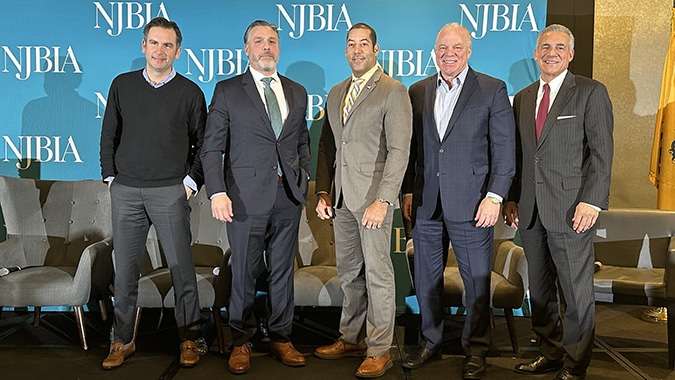Five of the candidates running for New Jersey governor in 2025 made their case to the state’s business community on Wednesday during a spirited discussion about taxes, affordability issues and regional competitiveness at NJBIA’s Public Policy Forum.
The audience of 225 businesspeople heard from former state Assemblyman Jack Ciattarelli (R-Somerset), who was narrowly defeated by Gov. Phil Murphy in the 2021 gubernatorial race and is now making is third bid for governor; conservative NJ101.5 radio personality Bill Spadea; Jersey City Mayor Steve Fulop; New Jersey Education Association President Sean Spiller; and former state Senate President Steve Sweeney.
Moderator Rick Thigpen, senior vice president for Corporate Citizenship at PSEG and NJBIA board member, asked each candidate to address the “fair amount of anxiety” about New Jersey’s business climate and how they would deal with that as governor.
Ciattarelli, an entrepreneur and CPA, pledged that if elected he would be “the most pro-business governor” New Jersey has ever had. “Of all the challenges we face, the one that is the easiest of the heavy lifts is making New Jersey a better place to do business," he said.
He said he would send a powerful message to the business community by recreating the Department of Commerce, which was dismantled years ago under the Corzine administration, with three deputy commissioners responsible for economic development in North Jersey, Central Jersey and South Jersey.
"Our state agencies will be there to work in partnership with you, not (act like) a police state or a collection agency,” Ciattarelli said, noting that it was a mistake for New Jersey to recently raise its corporate tax rate to 11.5% at the same time that neighboring Pennsylvania is on a path to reduce their corporate tax rate to 4.99%.
Fulup, a Democrat who has been the mayor of New Jersey’s second-largest city since 2013, noted he has led an economic renaissance in Jersey City and would use that executive-level experience to improve the state’s business climate. The first place he would start would be the New Jersey Economic Development Authority (NJEDA), which he said does not focus enough on smaller entrepreneurs and innovators.
“There’s a lot of things I can tell you that we would change,” Fulop said. “You can start at the EDA, structurally, how they approach things, where the barriers to entry are, the paperwork to get things moving, where they incentivize things. There’s a lot that can be done on that front to change the climate in the state.”
Spadea, who is running for the Republican nomination, said both small and large companies need a better business climate. “Three things that have to be done immediately: Cut taxes, end all the overregulation, and create an environment where you can hire the people that you need,” Spadea said. “What you ought to expect from your next governor is a promise that instead of hiring a bunch of ‘woke’ academics to run the government, that we’ll go to the business community first.
“States across the country have cut taxes. When you look at Pennsylvania, you look at Indiana, look at North Carolina ... these are states that cut their corporate business tax, and immediately, in year one, people moved into those states, jobs were created, businesses expanded, and yes, with a tax cut, tax revenue increased.
“And then lastly, when it comes to helping all of you hire the people you need, we've got to stop this mentality that every kid has to go to college. We've got to develop and invest in career and technical education. We need to talk about skilled trades. We need to focus on manufacturing and retail and hospitality and all of these things.”
Spiller, a former high school science teacher who was a council member and mayor in Montclair for 12 years and now runs the state’s powerful teachers’ union, spoke about the need to fix New Jersey’s challenges, such as high taxes and high healthcare costs that impact both families and businesses.
“It's a great place to live, it's a great place to do business, but it's hard place to afford,” Spiller said.
Sweeney, a Democrat who spent two decades in the Senate including 12 years as senate president, said some of the accomplishments made under his tenure were the reason NJBIA’s recent Business Outlook Survey for 2025 found that for the first time there is an increase in the percentage of people saying they would continue living in New Jersey during their retirement.
The repeal of the estate tax, the property tax cap, the elimination of income taxes for retirees with under $100,000 in annual income and lowering the sales tax have all helped in that regard, Sweeney said. Fully funding the state’s education aid formula has helped hold the line on property tax increases that would have otherwise been higher, he said.
During his time in office, Sweeney brought experts together to produce the “Path to Progress,” a series of government-reform ideas that includes pension overhaul, reduced healthcare costs and promoted incentives for school consolidations. Sweeney noted that today there are 70 districts studying consolidation and three districts have already merged, in moves that are more cost-effective for taxpayers.
“I’m someone who gets into the weeds,” Sweeney said. “I’m the most qualified to do the job.”
Other gubernatorial candidates invited to the NJBIA Public Policy Forum, who were unable to attend due to scheduling conflicts, were Newark Mayor Ras Baraka, state Sen. Jon Bramnick (R-21), U.S. Rep. Josh Gottheimer (D-NJ) and U.S. Rep. Mikie Sherrill (D-NJ).




